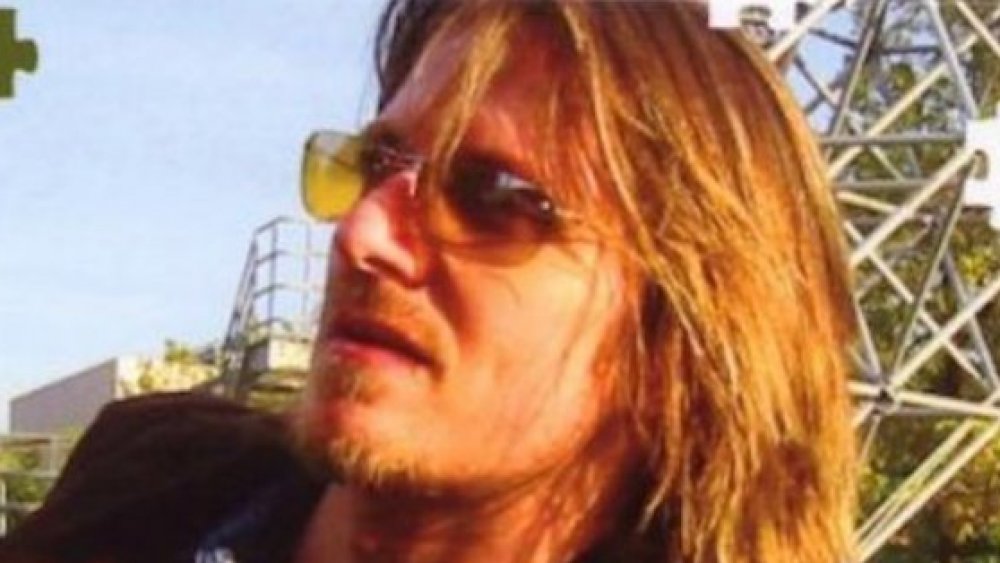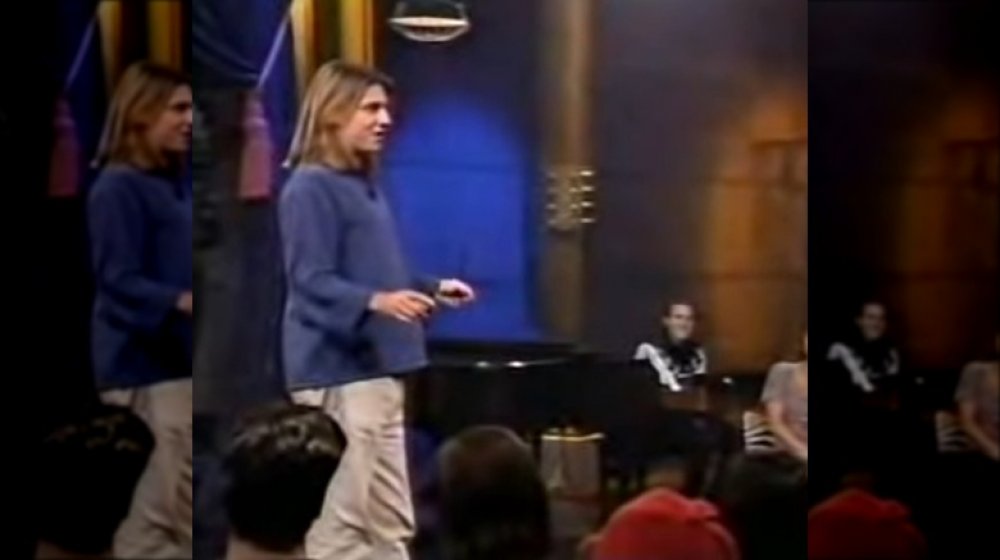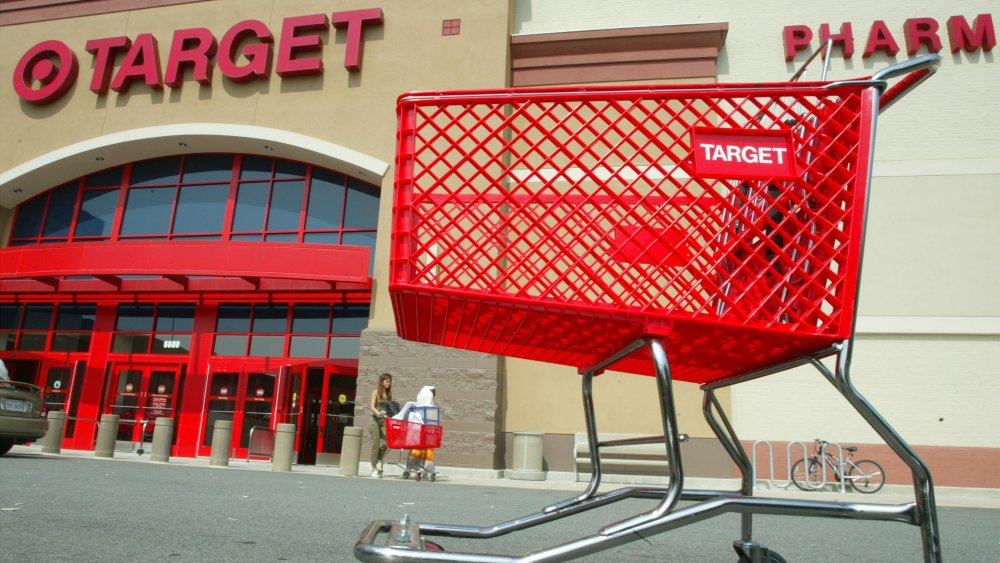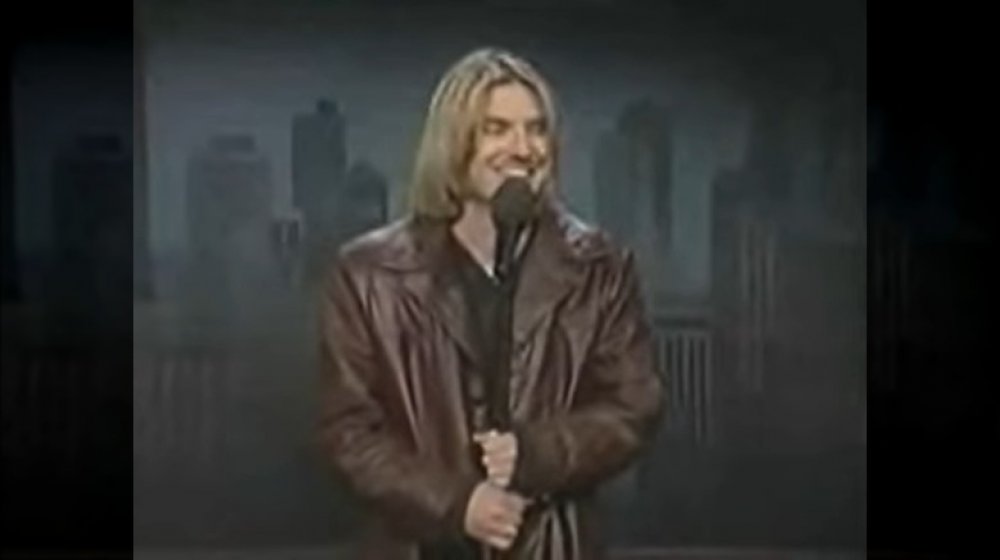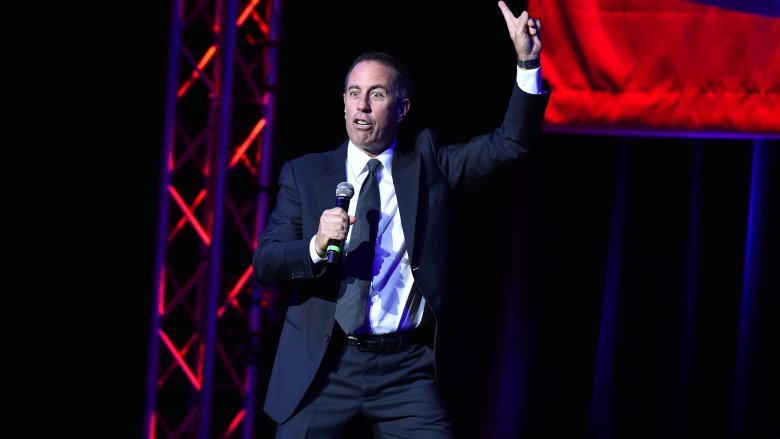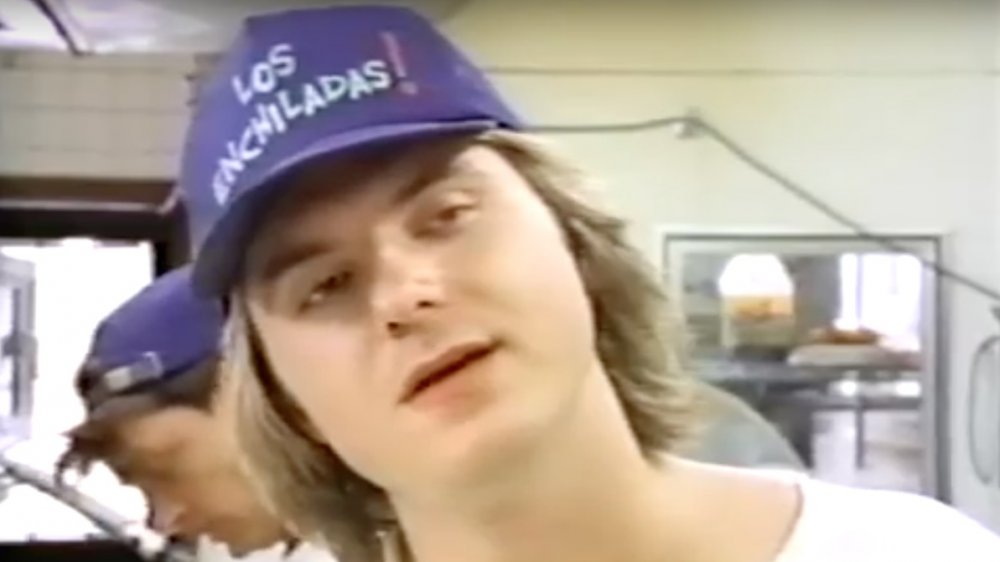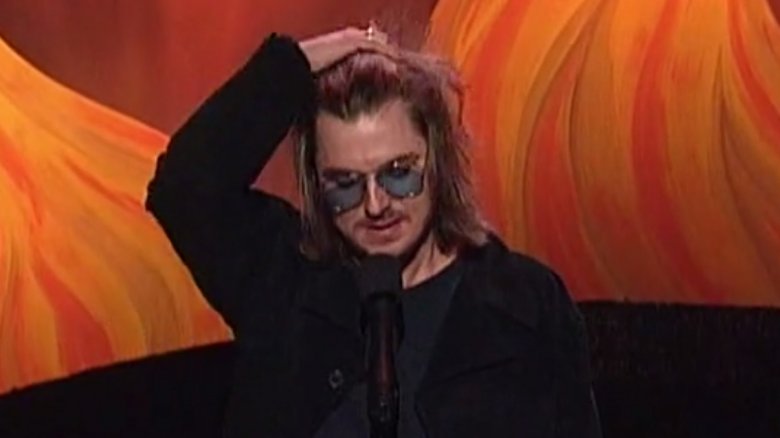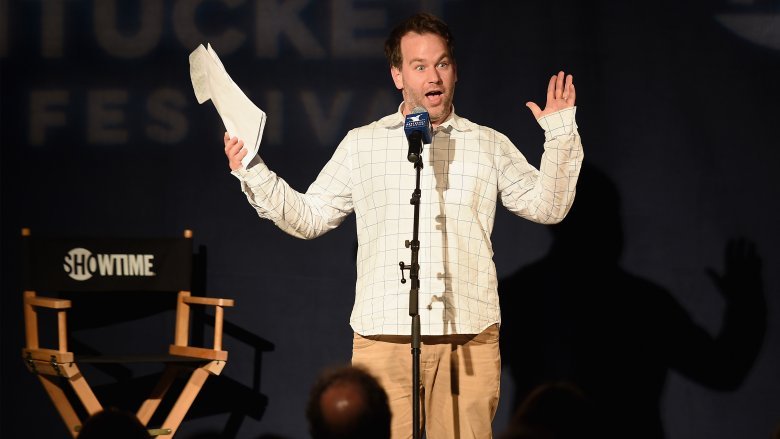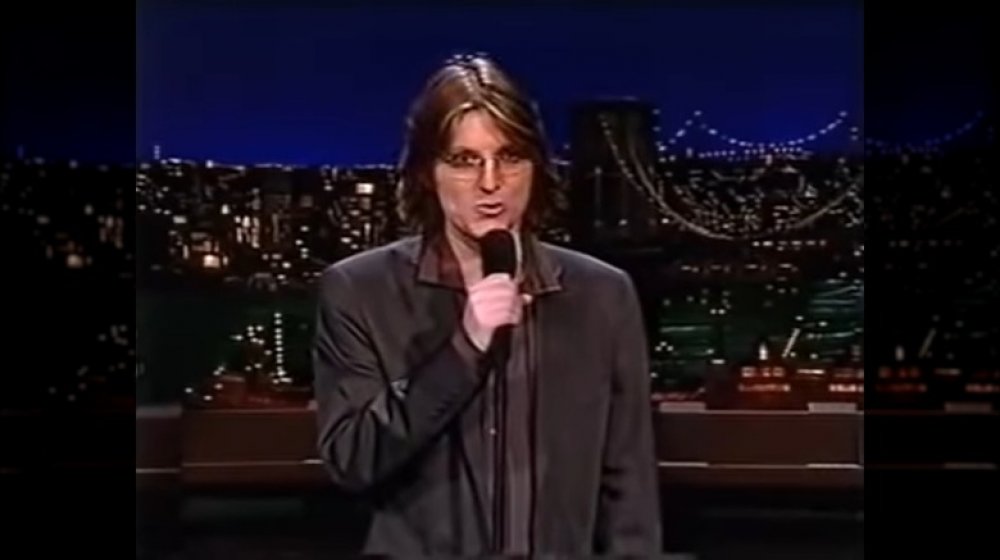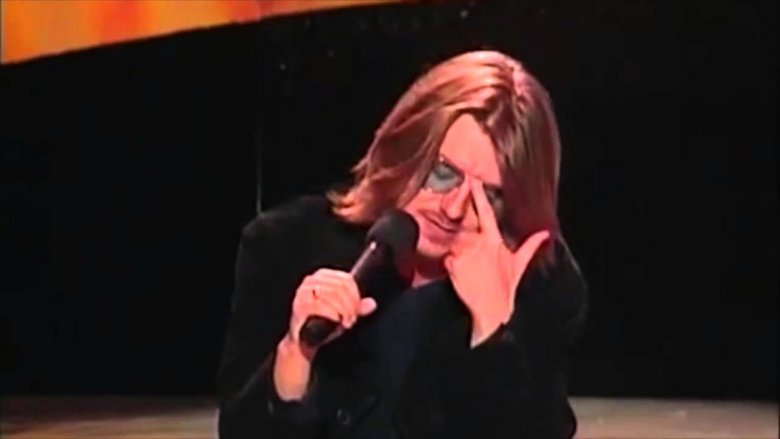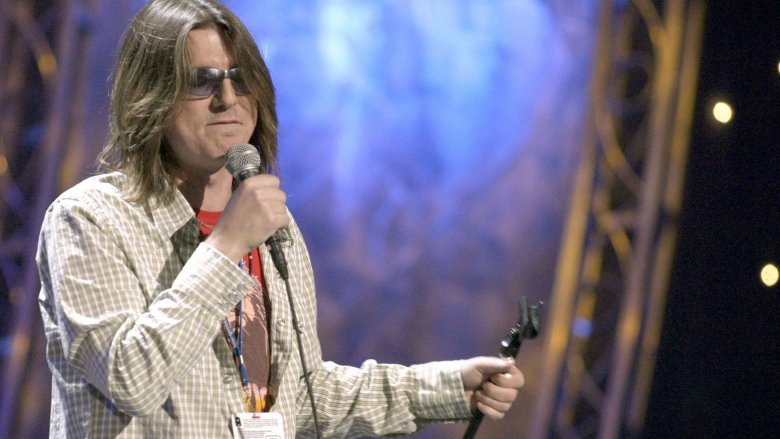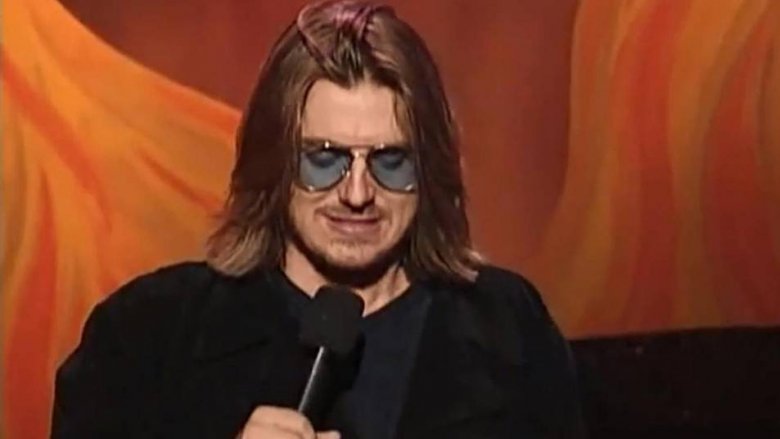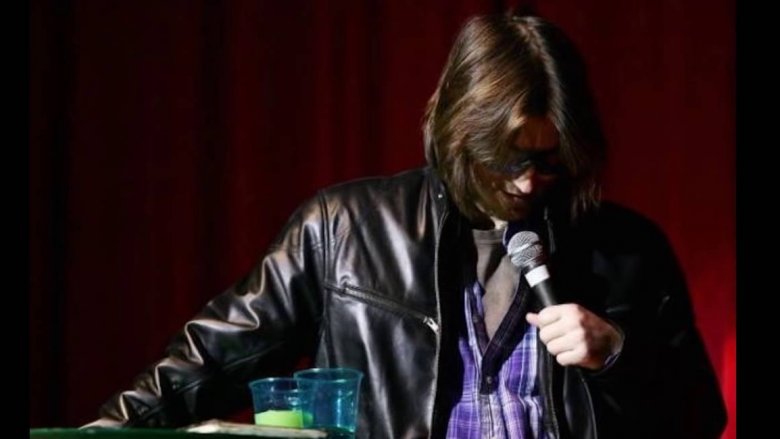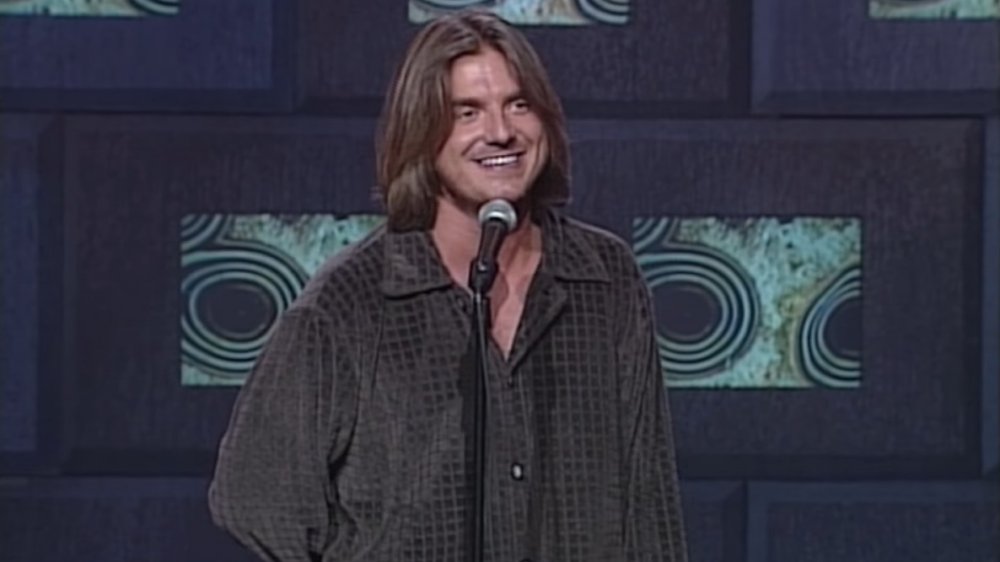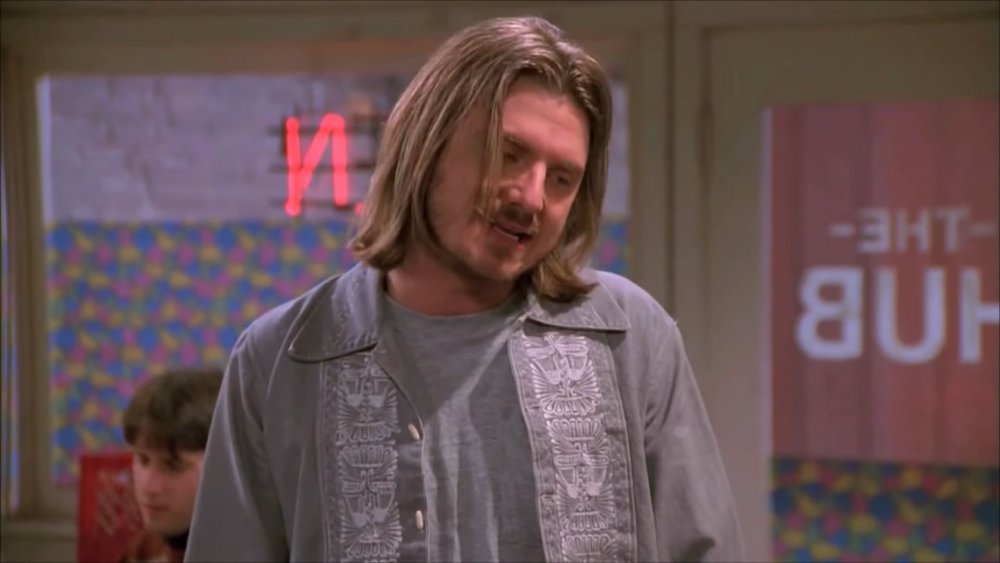The Untold Truth Of Comedian Mitch Hedberg
Mitch Hedberg was one of the greatest comedians of all time. He might not be a household name like George Carlin or Louis C.K., but he'll always be remembered for his signature style and incomparable delivery. Although his time here was sadly cut short, here's a look at the life of the amazing Mitch Hedberg.
Mitch Hedberg was born with a heart defect
If you think of Mitch Hedberg's laid-back stoner vibe, you might not think he came from the Midwest. (Or maybe you do, depending what you think of the Midwest.) He was born in Minnesota, and his family discovered early on that he had a heart defect. With him since birth, Mitch Hedberg's mother Mary claimed his condition often caused him anxiety. Later in life, his heart condition may have contributed to his untimely death.
Mitch Hedberg didn't have his signature delivery right away
A unique comedic voice like Mitch Hedberg's can't appear overnight. After working for a few years in crappy restaurants, he started getting stand-up work on the road. By 1995, he got a chance to do a couple TV appearances with the likes of Janeane Garofalo.
As you can see, his delivery isn't quite there. First, it's super weird to see him onstage without sunglasses. Though he still has some great non sequitur lines, he's a lot faster and lacks the relaxed confidence that would give him his inimitable delivery. Still, there are a couple classic Mitch Hedberg lines in the set: "When someone hands you a flyer, it's like they're saying 'Here. You throw this away.'"
Mitch Hedberg liked to write his stand-up at Target
It shouldn't be a big surprise that Mitch Hedberg's weird comedy was often created in odd places. His wife, Lynn Shawcroft has spoken about his writing style. She said he loved writing in places like Target, where he could be around normal people and overhear all the strange conversations that go down in a place like Target.
Hedberg loved writing. He was constantly writing jokes and insisted on always using a pen and legal pad–no typed routines for the deliberate comedian. Shawcroft mentioned that Hedberg was always on the lookout for new material, to the point he would sometimes document their conversations. She's also shared one of Mitch Hedberg's many notebooks, where he recorded a full fight between them. In the fight itself, he explains how fights can become jokes, then later writes down the fight where they fought about fights becoming jokes, and it's all just very meta. But only a true comedian would take a break during a fight to explain how it might be funny later on.
Mitch Hedberg wrote a fan letter to Uni-Ball pens
Mitch Hedberg was real serious about pens and paper. Since he always wrote each joke down by hand, he had some strong opinions about pens. Strong enough that he once wrote a fan letter to a pen company.
When Hedberg picked up a Uni-Ball pen, he fell in love. He adored the pens so much, he wrote a three-page letter to Uni-Ball singing their praises. He wrote, "Would you be interested in co-sponsoring a tour? We could put a large banner across the back of the stage: 'Gel Impact is responsible for the written versions of the jokes this comedian is saying.' I'd be so proud."
Mitch Hedberg had a $500,000 development deal with Fox
After extensive touring, Mitch Hedberg got his first break with a set on the Late Show with David Letterman. This led to an appearance at the 1998 Just for Laughs festival, where he really broke out. Fox wanted to jump on the Mitch Hedberg bandwagon and signed him to a $500,000 development deal. If you're not up with your industry lingo, a "development deal" means he got $500,000 to try to come up with some kind of Fox vehicle. Whether they actually made it or not, he still got 500 grand. Though he didn't end up doing much acting, he did appear as a well-cast stoner on That '70s Show and made a small appearance smoking fake pot with Peter Frampton in the film Almost Famous.
Time magazine called Mitch Hedberg 'the next Seinfeld'
Mitch Hedberg's star started to rise and he gained national attention. Salon called him the "funniest new comedian in the world," while Time magazine proclaimed Hedberg "the next Seinfeld." How Time came to that conclusion is a bit mysterious. Hedberg was often compared to Steven Wright due to the low-key delivery of both comedians, but Hedberg hardly seemed a Seinfeld type.
The two comics obviously didn't share a style, but Mitch Hedberg was never destined to have the broad appeal of Jerry Seinfeld. Seinfeld shared with the audience his frustrations with everyday life. Hedberg made jokes like, "I want to hang a map of the world in my house. Then I'm gonna put pins into all the locations I've traveled to, but first I'm gonna have to travel to the top two corners of the map, so it won't fall down." Though the comparison is flattering, proclaiming him the next mainstream king of comedy was only going to lead to disappointment.
Mitch Hedberg wrote and starred in the film "Los Enchiladas!"
In 1999, Mitch Hedberg decided to write and star in his own film and made Los Enchiladas! A film about workers at a lame Mexican restaurant in Minnesota, it's exceedingly loose. Jay Chandrasekhar of Broken Lizard edited the film and said on a podcast that Hedberg was great but constantly high. If a scene involved marijuana, they weren't smoking basil: it was all real. So by the last take, Hedberg and the other actor would be too high to even say their lines.
The film premiered at Sundance but didn't get anywhere. Since then, it's only been shown a handful of times after his death. Though it was never released on DVD, if you find a sketchy copy online, you'll see for yourself that it's not quite a masterpiece. Though Mitch Hedberg of course has his moments, it's too free and scattered to make much of a film.
Mitch Hedberg's Comedy Central special had a rough audience
After Mitch Hedberg's movie failed to gain interest, his acting career didn't do much better. Fox and Hedberg never found a project that worked, so he was dropped from his deal. Though he still had success on the road and on his many Letterman appearances, his Comedy Central special was a little tough.
Doing his first Comedy Central Presents was a big deal, but the audience was full of people totally unfamiliar with his style. If you watch the edited version of the special, it's great. The audience is onboard and loves his completely original delivery. But if you watch the unedited version, it's totally different. At first, the audience just doesn't get it. Really. After his joke, "I wanted to buy a candle holder but the store didn't have one, so I bought a cake," the audience responds with tepid laughter and a weird slow clap. So Hedberg openly says, "You gotta get into my jokes harder ... I have 21 minutes left. That's a long time."
At one point, he just sits down on stage, looking defeated, but keeps going. He finishes his planned set, then tells the audience he's going to do a few more jokes for "editing purposes." The last minutes are totally loose as he directly tells the audience that he wishes he could start his special over now that they're actually laughing. In the end, Mitch Hedberg won the crowd over, but it was hard work.
Mitch Hedberg was happy to help new comedians
Though the Comedy Central special was disappointing, Mitch Hedberg still had great success on the road. He toured constantly and was a favorite among other comedians. When Mike Birbiglia (Sleepwalk with Me, Don't Think Twice, Orange is the New Black) was still early in his career, Hedberg went out of his way to help the new comedian out. Hedberg performed at Birbiglia's CD release party. But he didn't just perform: he flew himself there and refused to be paid.
When Hannibal Buress (The Eric Andre Show, Broad City) was just starting out, Hedberg also did him a huge favor. When Hedberg played a weekend of sold-out shows in Chicago, he let Buress and about four other inexperienced comedians open for him. That never happens in the industry. But Mitch Hedberg was happy to give any stand-up a chance. That set started Buress' career as a stand-up, and he'll forever be grateful for the kind-hearted comedian.
Mitch Hedberg never said no to a job
Toward the end of his life, Mitch Hedberg was constantly touring. He'd do three shows a night, then go to the next place and do another weekend of shows. His wife said Hedberg never passed on a job. He'd been rejected so many times, he felt like he had to accept while he had the chance or all the rejections would start coming back. So he relentlessly traveled and performed until his last days.
Mitch Hedberg thought he could moderate his drug use
Tragically, Mitch Hedberg eventually died after a fatal mix of heroin and cocaine. Perhaps the worst part of it is that he knew he had a problem, but rather than kick the habit, he attempted to moderate it.
Hedberg was arrested for possession in May 2003, which is often a wake-up call for people to stop what they're doing, or at least try to. Mitch Hedberg had other ideas. In a 2004 interview with Las Vegas Weekly, Hedberg claimed he was going to do much less, so people couldn't associate him with drugs anymore. As he said, "You can't do copious amounts of drugs and stay alive ... so not all drug use has tapered off ... but I've learned just to stay under the radar." Basically, his plan was to moderate his drug use and not talk about it so much. Everyone would be happy, right? He also thought it might help his career, theorizing during that interview that since he got arrested for drugs once, any mistake he makes in the future will get blamed on drugs. So, to make himself look better, he was planning to do less drugs and be really quiet about the ones he did do.
He died a year later — due to drugs — so unfortunately, his plan didn't work.
Mitch Hedberg's fans would shout out punchlines before he could
Mitch Hedberg had a very deliberate delivery style — he didn't talk fast, and he didn't rush into punchlines. When it was time to deliver the joke, he knew when to deliver it. Some of his fans, on the other hand, had no such style and just wanted to hear their favorite joke. And if Mitch was, in their mind, lagging behind on delivering it, they would cook it up themselves.
According to Entertainment Weekly's article on the man, some of Hedberg's fans were so into him, they knew just about all his jokes by heart. If they felt their hero was taking too long to tell his joke, they would yell out the punchline for him. Like so: "This jacket is dry-clean only ... wh-" "WHICH MEANS IT'S DIRTY!"
Hedberg seemed to take it in stride, though he was known to chide fans who did that, scolding them with lines like, "Didn't you hear of a dramatic pause?" Clearly they had not, but that's probably one reason Mitch Hedberg wrote so much. That way, he could stay one step ahead of his fans.
Mitch Hedberg had severe stage fright
It's strange to hear that a guy who made his living performing in front of people was also terrified of doing so, but Mitch Hedberg was just that. It's kind of weird that Time called him "the next Seinfeld" when, personality-wise, the two weren't even remotely close. Seinfeld was the gregarious life of the party, while Hedberg was the guy at the party reading a book, wearing headphones, and trying not to make eye contact with anyone.
He told Time journalist Joel Stein during a 1998 interview, "I don't like to connect with the crowd. I find that if you look at people's faces, you see a disappointed face." And so, the prototypical Mitch Hedberg performance involved dark sunglasses, long hair draped over his eyes, and set-long staring contests with the floor. He also, as the New York Times put it, "sometimes closed his eyes as he performed." Reminder: the man wore sunglasses. And he would still close his eyes to keep the crowd away.
Mitch Hedberg would criticize his own jokes onstage
Every comedian messes up a joke on occasion. They're human, too, after all. But for the most part, comedians tend to ignore their flubs, moving right on to the next joke like nothing happened. Not Mitch Hedberg, though — he tended to ruminate on his failed jokes, criticizing them onstage on a level that few comedians could ever get away with.
Deadspin likened it to him breaking the fourth wall, turning from comic to critic if a joke didn't land. He would say things like, "That's like a carbon copy of the previous joke but with different ingredients. I don't know what I was trying to pull off there," almost like he was apologizing for a joke not garnering as many laughs as the last one. And then there was the time he said — on one of his CD releases, no less — "All right ... that joke is going to be good because I'm going to take all the words out and add new words. That joke will be fixed." Mitch Hedberg would straight-up say his jokes sucked, which in an odd way made him more endearing and relatable to his fans. It didn't hurt that far more of his jokes landed than crashed.
Mitch Hedberg nearly had to have his leg amputated
Mitch Hedberg's drug problem was known, though most people didn't realize how serious it was. Though he was open about smoking weed or doing acid, some weren't aware of his heroin problem. Then in 2002, he was arrested for heroin possession. As Hedberg was being processed at the station, they saw his leg was horribly infected. He'd been shooting heroin, it got infected, and now it was so bad he nearly had to have his leg amputated. The amputation was avoided only because the surgeons took muscles from his back and grafted them onto the damaged area.
Once he recovered, Hedberg returned to standup and sadly continued his drug use. In 2005, he died of heart failure most likely related to drug use.
Though he had a tragic end, Hedberg was perhaps the most interesting comedian of his time and will be remembered for his exceptional delivery, timing, and creative one-liners. He might not have been the next Seinfeld, but he didn't need to be. He was Mitch Hedberg.
Mitch Hedberg left behind a ton of new material
Mitch Hedberg's style is imitated by countless Twitter comedians, bound by the forced economy of the platform's character limit. But while tweet-jokers can churn out dozens of gags a day, the agile-brained Hedberg did the same thing in a pre-Twitter universe. And really, it should come as no surprise that a comedian who thrived in the world of one-liners and short, punchy, observational jokes was so prolific.
"Mitch was constantly jotting ideas onto paper," the late comedian's wife, Lynn Shawcroft, wrote in The Hollywood Reporter in 2018. "I have boxes and boxes of his notebooks, envelopes stuffed with hotel pads and scribbled-on napkins. I even found an airplane barf bag covered with notes." Hedberg also left behind boxes full of cassettes of him working out jokes, which Shawcroft said is all material the world hasn't heard. The couple also filmed four Hedberg shows on 16mm — which Shawcroft says is enough to make a concert movie — as well as a documentary film about his career. In fact, Hedberg shot it and narrated it himself.
In late 2017, Shawcroft says, she started working through this vast Hedberg vault. "I've been digitizing everything ever since. I'm almost done, too, so that everything Mitch left behind, every half-written joke, every spontaneous utterance onto microtape, will be accessible with a few clicks on a mouse." Here's hoping.
